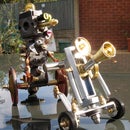Introduction: Easy-type Secure Passwords
Passwords are the bane of my life, especially where they need to be secure. I'll be glad when the add a security chip to my brain in the jar. Until then, I like them to be long and not easy to guess or crack, especially for financial sites. Some sites recommend using combined non-connected words to beat dictionary look-up (e.g. TreeWhale)
However, I don't like using real words or phrases etc. due to my hyper-digital-paranoia.
So, I used to use contrived random letters and numbers with a few symbols thrown in. e.g. Ugt565Tgr!dho£h67J
However, these get to be a real pain to type in and are easy to mistype. So what's the solution to random secure passwords that are long enough to be secure but easy enough to type? The answer is total nonsense.
I've long been a fan of Edward Lear and Lewis Carroll, both of whom are pre-computer nonsense writers supreme. So how do you make easy-type secure passwords? Using real-word sounding nonsense is the answer. Dictionary look-ups will fail but it will be easier to type. I find making it look like a sports score and using caps also works in breaking it up into manageable phonetic chunks.
Examples are:
SprigglyTig87QuiggleBoster23
ZirkyBelky12MarklePoot34
Prichenzal!Quirzy35?
!Minherpal23Spirkletack?
The problem is: how do you remember such rubbish? The answer is to write it down in your secret password book. But that's not really secure, is it? What if someone gets hold of the book or looked over your shoulder at a page? The answer is the keyword. This is an easy to remember word which you put in front of every password but don't write this down. So, if your keyword is Plop, the password becomes PlopDinkleGling56 but you record it as DinkleGling56.
Enjoy an easier secure password typing experience. That's all for now, f'f'f'f'olks!
Step 1: Who Needs Steps?
Steps are needed to get higher. This instructable is already high enough.













